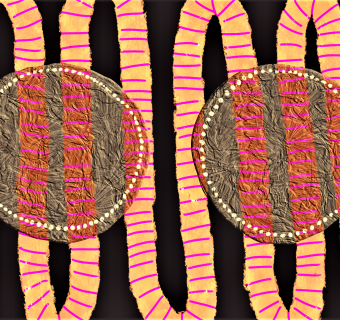 Founders Stephanie White and Sue Gass are sisters who have both chosen to live a gluten-free lifestyle.
Founders Stephanie White and Sue Gass are sisters who have both chosen to live a gluten-free lifestyle.Michelle Cho
If you’ve ever walked into a bakery, you know that it is a whimsical place. The sights, the scents, the sounds: Everything about the atmosphere transports you to a space that feels perfectly comfy, just like home. But when you have a food allergy that does not allow you to fully partake in the breaking of sweet bread, the bakery loses its magic. Stephanie White and Sue Gass are actively combatting this with their business, Stevie G’s. We sat down for a nice cup of coffee on a breezy fall afternoon and talked about what they’re doing in the Charlottesville community. Michelle Cho: Let’s begin with my favorite question. What is your small business story?
 Stephanie and Sue’s recipes use a variety of gluten-free flours and substitutes to produce yummy treats for all - gluten-intolerant or not!
Stephanie and Sue’s recipes use a variety of gluten-free flours and substitutes to produce yummy treats for all - gluten-intolerant or not!Stephanie White: My daughter was diagnosed with an allergy to gluten when she was in elementary school. It was very isolating for her because she was the only one who had this type of food allergy. She kept it private and it became very difficult for her to do anything social (such as birthday parties or sporting events) because she could not have cake or the snacks prepared for after practice. As a concerned mom, I started to prepare the food for my daughter’s social activities myself. She would have her snacks and then share with friends. Nobody knew they were gluten-free. Pretty soon, her peers started asking for her to bring my snacks, and by the time my daughter entered high school, I received a lot of encouragement to go ahead and start my own bakery. Sue Gass: I had worked at my career as a paralegal for a long time and was looking for a change. I was excited by the idea of a business that would make people happy! We talked about starting the bakery together and that’s how it launched. We started baking out of our house kitchens. We then manually walked our product to different places and festivals, seeing which restaurants and coffee shops would want to carry it. We were able to start selling at the city farmer’s market and started networking and receiving feedback directly from our customers. We had been conducting market research in this way for about six months when we heard about CIC (Community Investment Collaborative). We do not have business backgrounds. We knew what we were doing as far as the baking went, but beyond that, we were lost in the business sense. So thankfully, CIC walked us right through all of that. They helped us grow so much and continue to be very supportive in helping us stay a viable and sustainable venture.
From that point on, we had a vision.We had a mission to make a freshly baked gluten-free product, easily accessible and available. We wanted it to be as easy as getting coffee with your friends. For us, it was about the social experience, meaning that nobody had to eat a mass- produced, commercially-branded goodie because vendors didn’t offer any of the fresh gluten-free variety.
We also wanted to use high quality ingredients. We wanted to unite the world of food allergy and non-food allergy. Our goal was to create an incredibly delicious product for all. It wouldn’t matter if it was gluten-free or not because it was so yummy you’d eat it anyways. MC: Can you talk a little about your micro-finance experience and how CIC assisted in that aspect? SG: Our experience was certainly special. Kiva had just launched a zip-loan program in Richmond and we were honored to attend that event. We got to see Mark Warner and the founder of Kiva, who shared the organization’s story. Afterward, we got set up online and were able to crowd-source funds like a Kickstarter campaign- the only difference of course being that we were receiving micro-loans instead of gifted donations. We were funded very quickly and it was super exciting. It was interesting to see where the money trickled in from, like “Oh! We just got $25 from some nice people in Germany!” It was fantastic to see people from all over the world contribute and send encouraging comments our way. We also got to thank everybody which was a really fulfilling experience. SW: We absolutely believe that we are only where we are now because of CIC. When we were taking the class, there was only one paid employee. The level of volunteerism that exists within CIC is inspirational. When we graduated, we stood up to say thank you and I was overtaken with the genuine interest CIC had in us. It was truly moving. MC: Gluten-free baking is harder than it might appear, even just chemically. Can you describe the learning process of how you developed your product? SG: Lots of trial and error. We have finally got it down as far as our basic mix, but it is hard to bake when you are missing the major molecule that creates that fluffy texture that gluten produces.
 Stevie G’s ice cream sandwiches are sold at Rebecca’s Natural Foods at Barracks Road Shopping Center and at dining halls on Grounds.
Stevie G’s ice cream sandwiches are sold at Rebecca’s Natural Foods at Barracks Road Shopping Center and at dining halls on Grounds.SW: Since we are working with a unique set of non-traditional ingredients, we like to experiment and come up with fun new stuff. We just made a whoopie pie- a mainstream product that isn’t commonly available for gluten-free eaters- and also a new ice cream sandwich. It took a lot of tampering with, but we like to have fun. MC: So where did the name Stevie G’s come from? SW: When we first started, choosing a name was probably the most difficult decision we had to make. Growing up as sisters, my nickname was Stevie. My family members are the only ones who ever call me that. Sue’s last initial is G, and we wanted to keep Stevie, so we went with Stevie G’s. MC: What has the experience been like working as both sisters and business partners? SW: A lot of people say that they could have never work professionally with their sister. Sue and I have always been incredibly close and are best friends. Starting a business together is definitely different than being sisters where your roles are a lifetime defined. As business partners, there are administrative roles and duties you have to grow into and learn from. I’d say working together strengthens our relationship. It strengthens us. SG: I don’t know if could have ever done this on my own. This bakery is a huge undertaking and a very physical job. It is all about production - mass production. It was great working with Stephanie because we already knew our strengths and weaknesses. We didn’t really have to discuss them- we just knew. And we benefitted greatly from our understandings of each other stemming from growing up together. MC: If you could give young entrepreneurs a single piece of advice, what would it be? SW: It’s critical to have a passion for what you are doing. Over a desire to make a living or a career, you have to have passion. It is really the day-in and day-out obstacles that you face. When you have more passion, there is more staying power. You also need to have the willingness to take a risk on what you feel so passionate about. That’s what builds an entrepreneur. SG: My piece would be to work harder than you ever thought you could. Goals are important. Having a plan is really important. We initially didn’t have a plan. CIC helped us realize the value of having a plan and assisted us in making it happen. Be prepared. When you have a passion, it becomes your baby. Entrepreneurship is definitely a lot harder than it may seem, but it is so rewarding. It’s a spirit.
Read about more women in this series:
Elizabeth James - The Happy Tomato Sara Clayborne - Charlottesville Ballet






